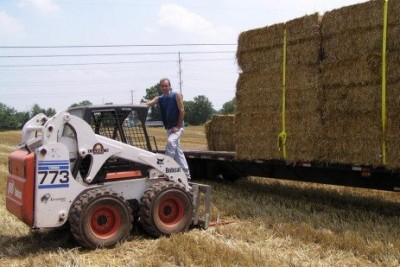Straw: To Bale or Not to Bale?

By Andrew Frankenfield; originally published https://extension.psu.edu/stra...
Wheat harvest has started in southern Pennsylvania and balers will be running closely behind the combines to get the straw baled and soybeans planted. With the spike in fertilizer prices this growing season, the nutrient value in the straw is higher than ever. A nutrient analysis would be ideal for your farm but book values for wheat straw are estimated at 11 pounds of N, 3 pounds of P2O5, and 20 pounds of K2O per ton of straw. Using values of N=$1.10/lb, P2O5=$1.07/lb, and K20=$0.75/lb, that equals $30/ton in total value of nutrients removed per ton of straw. Add on to that the baling and transportation cost, the value of the straw will likely exceed $75/ton as large square bales. Also, don't forget about the storage and hauling cost, you may be close to $100/ton breakeven.
If wheat straw is spread and not baled, each ton will return 11 pounds of N, 3 pounds of P2O5, and 20 pounds of K20. The nitrogen will not be immediately available for uptake, the P2O5 is not too significant, but the K20 certainly is. If two tons of straw is left on the field 40 pounds of K20 is returned to the field. At $0.75 per pound of K20 that is $30 per acre plus the organic value of the carbon going back on the field.
Another way to recover some of the K20 from the straw is to spread the straw out the back of the combine, allow it to rain on it, and leach some of the K20 from the straw into the soil then rake it up and bale it. Is that worth recovering some of the $15 per ton of K20? Not likely if you are planning to sell your straw, you will likely take a larger loss on your price per ton you receive, compared to the other farmer with bright yellow straw.
The take-home message is whether you bale your straw or not, make sure you have enough K20 for the next crop. Extension Educators have reported across the state it is not too uncommon to see K20 deficiencies in corn and soybeans.
Upcoming Events
WNY Pastureland Conversion & Soil Health Field Day
July 16, 2025
Middleport, NY
Join American Farmland Trust for the Western New York Soil Health Field Day on July 16, 2025, at Zeliff Farm in Middleport, NY, from 9:00 AM-3:15 PM. Learn about pasture conversion, soil health benchmarking, biochar in grazing systems, and best grazing practices. Plus, enjoy hands-on demos with the NY Soil Health Trailer, drones, and cover crops! Check out the attached agenda for more information about the field day and REGISTER HERE. Zeliff Farms is a regenerative beef operation who has recently partnered with AFT on outreach and education to farmers including learning circles and evaluating biochar effects on soil health.
IPM Strategies to Protect Corn and Soybean Seed in NY
July 30, 2025
Hamburg , NY
SWNYDLFC and Cornell IPM are hosting a grower meeting to discuss integrated pest management strategies for protecting corn and soybean seed in New York.
FAMACHA Training for Sheep and Goat producers in Woodhull NY
August 13, 2025 : FAMACHA Training in Woodhull
Woodhull, NY
Join us for a discussion and hands-on training for internal parasite integrated pest management in sheep and goats. Certification is available to all students participating in the workshop.
Announcements
No announcements at this time.





